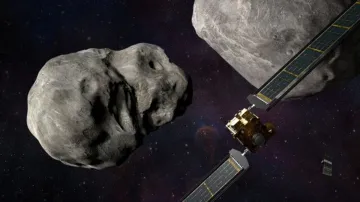NASA's Jet Propulsion Laboratory has reported that two asteroids (2020 GE and 2024 RO11) are set to pass by Earth on September 24. This comes during a busy month for asteroid sightings, raising interest among skywatchers.
Asteroids 2020 GE and 2024 RO11 on Approach
Size and Distance of Asteroids
The smaller asteroid, 2020 GE, measures approximately 26 feet in diameter—about the size of a bus. It will approach Earth at a distance of just 410,000 miles. In contrast, asteroid 2024 RO11, recently discovered, is significantly larger at 120 feet, roughly the size of an aeroplane, and will pass at a safe distance of around 4,580,000 miles.
No Threat to Earth
Despite their close approaches, both asteroids pose no threat to our planet. Skywatchers equipped with specialized telescopes may even catch a glimpse of these celestial bodies on the 24th.
Upcoming Asteroid 2024 RK7
Following closely behind, asteroid 2024 RK7 is expected to pass by on September 25. Slightly smaller than 2024 RO11, it measures 100 feet in diameter, further adding to this month's asteroid activity.
Understanding Asteroids
Asteroids are rocky bodies composed of metals and minerals that orbit the Sun, primarily residing in the asteroid belt. They come in various sizes and shapes. While many pass harmlessly by Earth, some enter our atmosphere and become meteoroids, which often burn up and create bright streaks known as meteors.
ALSO READ: Elon Musk plans to open a portal to Mars by October 2026
As SpaceX gears up for these groundbreaking missions, the focus remains on technological achievements and the broader vision of human settlement on Mars, even as Musk navigates the intersection of politics and space exploration.
ALSO READ: NASA delays SpaceX crew-9 mission to ensure safe launch: New date set for September 26
SpaceX’s Crew-9 mission to the International Space Station (ISS) has been rescheduled for September 26, 2024. Initially set for August 18, the delay provides additional time for final prelaunch procedures, ensuring all systems and equipment are fully prepared. The launch will now take place no earlier than 2:05 p.m. EDT (1805 GMT) from Space Launch Complex-40 at Cape Canaveral Space Force Station, Florida. The delay also considers weather conditions and other essential prelaunch checks.

